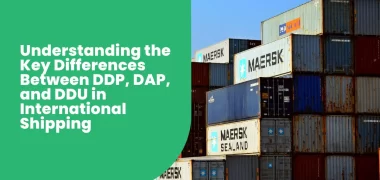In the realm of international shipping, Incoterms (International Commercial Terms) are vital as they define the responsibilities of buyers and sellers in global trade. Among these, DDP (Delivered Duty Paid), DAP (Delivered at Place), and DDU (Delivered Duty Unpaid) are commonly used terms that outline different obligations for shipping goods. Understanding the key differences between these terms can help businesses navigate international logistics more effectively. Let’s explore each term in detail.
Delivered Duty Paid (DDP)
DDP (Delivered Duty Paid) is one of the most comprehensive Incoterms for the seller. Under DDP terms, the seller assumes nearly all responsibilities and risks until the goods are delivered to the buyer’s specified location. This includes:
- Export and Import Duties: The seller is responsible for paying both export and import duties, taxes, and customs clearance.
- Transportation: The seller arranges and pays for all transportation costs, including shipping to the final destination.
- Risk and Insurance: The seller bears all risks until the goods reach the buyer’s premises. The seller may also arrange insurance, although it’s not mandatory.
Advantages of DDP for the Buyer:
- Simplified process: The buyer doesn’t need to deal with customs formalities or duties.
- Lower risk: The seller assumes most risks and responsibilities.
Disadvantages of DDP for the Seller:
- Higher cost: The seller bears significant costs and responsibilities, including unforeseen customs issues.
- Complexity: Managing international customs and duties can be complex and require extensive knowledge.
Delivered at Place (DAP)
DAP (Delivered at Place) terms mean that the seller delivers the goods to a specified place in the buyer’s country, but the buyer is responsible for import duties and taxes. Key aspects include:
- Export Duties: The seller handles export duties and formalities.
- Transportation: The seller arranges and pays for transportation to the agreed location.
- Risk and Insurance: The seller bears all risks until the goods are delivered to the specified location, excluding import customs duties and taxes.
Advantages of DAP for the Buyer:
- Moderate involvement: The buyer only needs to handle import customs duties and taxes.
- Reduced risk: The seller manages most of the transportation risks.
Disadvantages of DAP for the Seller:
- Responsibility: The seller must manage transportation and ensure delivery to the specified location.
- Import complexities: The buyer must navigate import duties and customs clearance.
Delivered Duty Unpaid (DDU)
DDU (Delivered Duty Unpaid) is an older Incoterm replaced by DAP in the latest Incoterms 2020, but it’s still used informally in some contracts. Under DDU terms:
- Export Duties: The seller is responsible for export duties and formalities.
- Transportation: The seller arranges and pays for transportation to the delivery location.
- Import Duties: The buyer is responsible for import duties, taxes, and customs clearance.
- Risk and Insurance: The seller bears risks until the goods are delivered to the specified place, excluding customs and duties.
Advantages of DDU for the Buyer:
- Control over import duties: The buyer manages and pays import duties, offering potential cost savings.
- Seller responsibility: The seller handles transportation and export duties.
Disadvantages of DDU for the Seller:
- Limited control: The buyer must handle customs clearance and import duties, which can lead to delays.
- Potential confusion: As DDU is not an official term under Incoterms 2020, misunderstandings can arise.
Key Differences Between DDP, DAP, and DDU
- Responsibility for Duties and Taxes:
- DDP: Seller is responsible for both export and import duties.
- DAP: Seller handles export duties; buyer handles import duties.
- DDU: Seller handles export duties; buyer handles import duties (similar to DAP but less formally recognized).
- Risk and Responsibility:
- DDP: Seller assumes almost all risks and responsibilities until delivery.
- DAP: Seller bears risks until the goods reach the agreed place; buyer handles import customs.
- DDU: Seller bears risks until delivery but does not handle import customs (similar to DAP).
- Costs Involved:
- DDP: Higher costs for the seller due to full responsibility for duties and transportation.
- DAP: Moderate costs for the seller; buyer incurs import duty costs.
- DDU: Similar to DAP, but potentially more negotiation is required due to its informal nature.
Conclusion
Choosing the right Incoterm—DDP, DAP, or DDU—depends on the specific needs and capabilities of both the buyer and seller. Understanding these terms helps businesses manage their logistics more efficiently, ensuring smoother international transactions. Each term offers different advantages and responsibilities, and selecting the appropriate one can significantly impact the cost, risk, and complexity of the shipping process.




